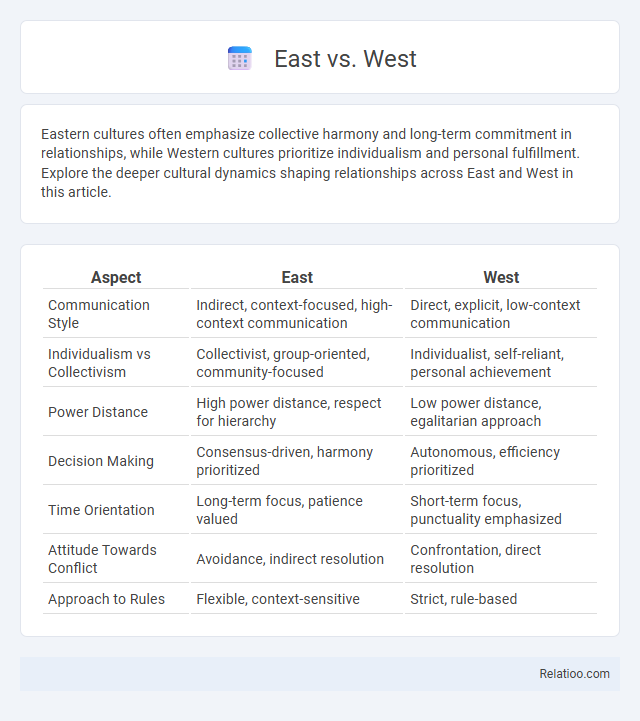Eastern cultures often emphasize collective harmony and long-term commitment in relationships, while Western cultures prioritize individualism and personal fulfillment. Explore the deeper cultural dynamics shaping relationships across East and West in this article.
Table of Comparison
| Aspect | East | West |
|---|---|---|
| Communication Style | Indirect, context-focused, high-context communication | Direct, explicit, low-context communication |
| Individualism vs Collectivism | Collectivist, group-oriented, community-focused | Individualist, self-reliant, personal achievement |
| Power Distance | High power distance, respect for hierarchy | Low power distance, egalitarian approach |
| Decision Making | Consensus-driven, harmony prioritized | Autonomous, efficiency prioritized |
| Time Orientation | Long-term focus, patience valued | Short-term focus, punctuality emphasized |
| Attitude Towards Conflict | Avoidance, indirect resolution | Confrontation, direct resolution |
| Approach to Rules | Flexible, context-sensitive | Strict, rule-based |
Historical Foundations of East vs West
Historical foundations of East vs West respect reveal deep-rooted cultural values shaping social interactions; Eastern societies emphasize collective harmony and filial piety, grounded in Confucian principles that prioritize elders as pillars of wisdom and authority. Western cultures often highlight individualism and egalitarianism, evolving from Greco-Roman traditions that value personal autonomy and meritocratic recognition over hierarchical deference. Your understanding of these distinctions enhances cross-cultural communication by acknowledging how historical contexts influence the perception of respect towards elders.
Philosophical Differences Between East and West
Eastern philosophical traditions emphasize respect for elders as a reflection of harmony, collective well-being, and filial piety deeply rooted in Confucianism and Taoism, whereas Western thought often approaches elder respect through individualism, autonomy, and reciprocal dignity influenced by Greco-Roman ethics. Your understanding of elder respect will differ between Eastern contexts, where age signifies accumulated wisdom vital to societal cohesion, and Western contexts, which prioritize personal achievement and equality. These contrasting perspectives reveal fundamental philosophical divergences in how cultures value age, authority, and the social role of elders.
Cultural Values: Collectivism vs Individualism
Eastern cultures emphasize collectivism, prioritizing family harmony, group cohesion, and respect for elders as a reflection of social hierarchy and interdependence. Western cultures often promote individualism, valuing personal autonomy and self-expression, which can lead to more egalitarian views of elder respect rather than strict hierarchical reverence. Elder respect in Eastern societies is deeply embedded in Confucian values and communal responsibilities, contrasting with Western approaches that highlight individual rights and reciprocal relationships.
Approaches to Education and Learning
East Asian cultures emphasize respect through discipline and collective harmony in education, fostering perseverance and respect for teachers as authority figures. Western education values critical thinking and individual expression, encouraging students to question and develop personal viewpoints. Your approach to learning can benefit from integrating Eastern dedication and respect with Western innovation and self-direction.
Religion and Spiritual Perspectives
Eastern religions like Hinduism and Buddhism emphasize elder respect through concepts such as karma and dharma, viewing elders as spiritual guides who embody accumulated wisdom and life experience. Western religious traditions, especially Christianity, promote honoring elders as a form of divine commandment, often linking respect to family values and moral duty within a spiritual framework. Indigenous and tribal spiritualities frequently regard elders as sacred keepers of ancestral knowledge and communal rituals, positioning them as vital mediators between the spiritual and temporal worlds.
Communication Styles and Social Norms
Eastern cultures emphasize indirect communication and high-context interactions, where respect for elders is shown through formal language, honorifics, and deference in social settings. Western communication styles tend to be direct and low-context, valuing individual expression while respecting elders through verbal acknowledgment and inclusive dialogue. Social norms in Eastern societies prioritize hierarchical relationships and collective harmony, whereas Western norms encourage egalitarianism and open, straightforward exchanges between generations.
Economic Systems and Business Practices
Eastern cultures often emphasize collectivism and hierarchical respect for elders, shaping economic systems that prioritize long-term relationships, family businesses, and consensus-driven decision-making. Western business practices tend to focus on individualism, merit-based respect, and innovation, promoting competitive markets, rapid scalability, and performance-driven leadership. In elder respect, Eastern economies integrate age-based authority within corporate structures, whereas Western economies lean towards egalitarianism and expertise regardless of seniority.
Art, Literature, and Artistic Expression
Eastern cultures often emphasize elder respect through traditional art forms such as calligraphy, ink painting, and classical literature that highlight wisdom and ancestral reverence. Western artistic expression tends to focus on individualism and innovation, seen in Renaissance art, modernist literature, and evolving artistic movements that prioritize personal creativity over hierarchical respect. Elder respect in art and literature thus reflects broader cultural values: Eastern works preserve legacy and communal harmony, while Western pieces often celebrate originality and progressive thought.
Attitudes Toward Technology and Innovation
Eastern cultures often emphasize collective harmony and respect for elders, leading to cautious adoption of technology that aligns with traditional values. Western societies prioritize individualism and innovation, fostering rapid technological advancement but sometimes undervaluing elder input. Elder respect in the East encourages integrating technology with social cohesion, whereas Western attitudes favor disruptive innovation even if it challenges established norms.
East Meets West: Bridging Cultural Gaps
East meets West in the realm of elder respect by blending collective reverence with individual autonomy, fostering mutual understanding and adaptation. Your approach to honoring elders can integrate Eastern values of familial duty and Western emphasis on personal dignity, creating a balanced dynamic that respects traditions while embracing modernity. Embracing this cultural synergy bridges gaps and enriches intergenerational relationships globally.

Infographic: East vs West
 relatioo.com
relatioo.com